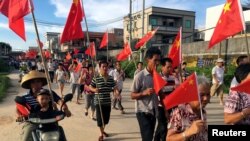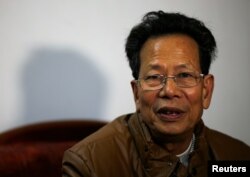Tensions are rising in China’s southern coastal fishing village of Wukan after authorities arrested an influential and elderly village chief, Lin Zulian, on alleged corruption charges.
Authorities sealed off the village to reporters, which is a symbol of resistance in China, with only a handful still able to stay inside. Riot police have been sent in even as residents continue to protest Lin’s arrest and demand his release.
Wukan became a symbol of resistance against the widespread problem of land grabs and corruption in China five years ago when its local residents rose up against local party leaders sealing off the village.
In a rare concession for the communist party, which has a little tolerance for anyone who challenges its authority, the officials were removed and Lin and other protest leaders were later elected as replacements.
Problems still unresolved
Some call Wukan China’s “democracy village.”
Despite government pledges to resolve the village’s land grab problems and the election of Lin and others, the problem has yet to be resolved. Now, with Lin’s arrest in the middle of the night early Saturday, authorities are suggesting that he is just as corrupt as those he replaced.
Local residents argued that the corruption charges were just an excuse to detain Lin as villagers were scheduled to hold a large gathering on Sunday regarding the lingering land dispute.
Following Lin’s arrest, thousands of local residents took to the streets on Sunday, waving Chinese flags and demanding the release of the village chief. Protests continued on Monday, although slightly smaller, but residents have pledged to not give up.
While defiant, the protests have been peaceful.
On Monday, many signed a massive petition calling for Lin’s release, leaving their thumb prints in red ink.
Villagers have told VOA that in addition to the arrest of Lin Zulian, his grandson has been detained as well. Officials have yet to confirm that arrest, but in the past authorities have used family members to pressure those in detention to make confessions.
In perhaps one telling sign, local villagers said that the locator for the grandson’s cell phone showed that he is at a local public security office.
Moving swiftly on Monday, in the wake of Sunday’s protests, authorities announced that Lin had already been replaced by his deputy, Zhang Shuijin. Authorities also said that they had little choice but to take Lin into custody because of the “huge bribes” he had received since taking office in 2012.
Officials did not say just how much money Lin had taken in bribes or for what specific projects, but said an investigation into Lin was launched following multiple complaints from local residents.
In a statement, authorities said a three-month investigation into Lin concluded on June 17, just one day before his arrest.
Democracy, drastic actions
State media also weighed in quickly, with the Global Times penning an editorial on Monday arguing against what it called “democratic” and “drastic actions” to resolve such disputes.
“Disputes over property disputes cannot be solved merely through democratic means,” the editorial said.
“If the drastic actions of the Wukan villagers are adopted by other people involved in disputes, China sees mess and disturbance at a grassroots level,” it said. “This jeopardizes the common interests of society.”
The article added that the disputes “may eventually be solved in accordance with the law,” but added that “only villagers' lawful demands would be met.”






